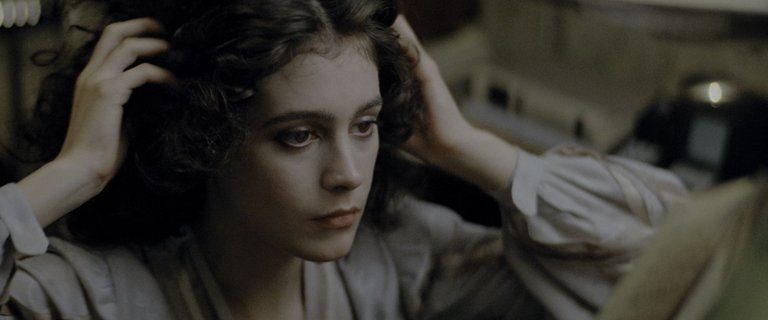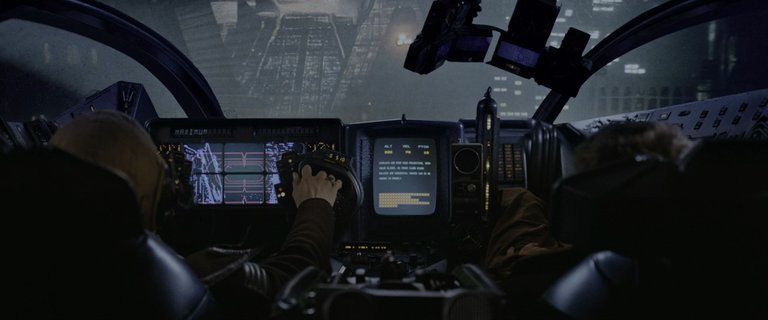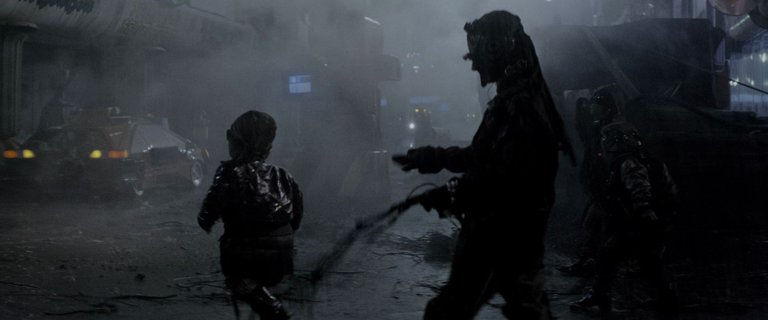Revisiting 'Blade Runner' by Ridley Scott: Influential Cyberpunk

Blade Runner has always been one of my favourite films from a younge age, where my love for the cyberpunk genre began having seen the film airing many times late at night on a small, square television I had in my room. Something about the idea of Blade Runner just impacted me, an interest in the music, the style of it through its mixture of beautiful artificial light and dark, gloomy cities that tower over all light. Years later I read the book the film is based on, then moving into Gibson's Neuromancer Trilogy and his short stories. Though the cyberpunk genre has mostly been a series of strong misses over the years, I still love its ideas. With Cyberpunk: Edgerunners being a big hit recently, I figured I would go back and watch Blade Runner again, given it has been a few years since my last viewing.
Despite the vast amount of themes to explore within the cyberpunk genre, it appears that most attempts fail to really address them in most capacities. Where Blade Runner has been strong and influential, and resulted in a large number of copies as certain themes it heightened have been the general standard for future cyberpunk creations. While still relatively thin in parts, Blade Runner addresses the mixture of high technology and low living quality, where the bright and the colourful neon just masks the dark, decayed reality that has swallowed up all nature and beauty in the world. It displays the world under the control of the megacorporations which run the world under capitalism gone mad. But it also questions one of our biggest curiosities: what does it really mean to be alive? And at which point can something be considered human as we ascend into a realm of transhumanism?
Blade Runner is a far from perfect film, however. It struggles from pacing issues that will most certainly bore the average viewer, and dances with the idea of promoting certain theories and concepts within its narrative regarding its characters that ultimately add to some confusion and lack of direction where it just is not necessary; something I have seen many discuss online in the past upon their first viewing. In my case, I don't mind it, but with the perspective of an outsider not so interested and engaged in the cyberpunk themes to begin with, I can see how it may not catch the attention of all. Particularly in the ways in which it strays from its source material.

Ridley Scott's Blade Runner has what I would consider to be a somewhat first-mover's advantage in regards to the genre, where futurism and its concepts were very much present in media, but still somewhat lacking in the production scale and depth of the film. The film grain as a result of being shot on 35mm film stock definitely contributes to the way in which the film's visuals are presented to us. Where the gritty look of a futuristic Los Angeles shows poverty, destruction, and a lack of hope as the streets used by thousands daily are left to rot with the technology and structures of the prior decades. Humanity reaching up to the sky with its growth of cities, where the lowest of the low remain at the ground level in that forgotten realm. The way the film portrays this scale is great, showing megastructures built by megacorporations that just drown the rest of the city, of which is already very wide and tall. Where the scenes of cars flying as they weave between the buildings on their way to the megastructures provide depth to us as the audience.
It is little moments like these that reveal the grand scale of things. It is not done through exposition, nor are these aspects of the world ignored despite their very brief appearances in the film, but it promotes the immersion and scale of the location in which our characters inhabit. Looking at other cyberpunk creations, many fail to recognise the ways in which the world can be portrayed even in moments of one scene moving into the next; without the need for it to be forced. I like the way that Blade Runner does this, especially from the start to get things over with, while still providing snippets of it as the film progresses and our character moves from one location to another. This is met with a very ethereal music most of the time, which adds to the marvel of what humanity has built, though we see from the story and our character's own perspective that not all is wonderful.
This is where the story shines and questions what it means to be alive. Where we cling to the idea of nature and real animals, where artificial ones are insanely expensive. We see that humanity has hit this depression and longs for a life under nature again, though incapable of reversing the destruction caused with the abandonment of nature. Lines of dialogue reflect humanity's interest in nature over the concrete and the neon, though at the stage where even our own existences are questioned: what does it mean to be human? What is a human when we have these Replicants roaming around that feel, think, and act just as we do? This is met with the consideration of transhumanism as biological hacking on a human scale can be found in regular street corners. Where the mechanical items of our creation fill the streets themselves.
This is something that the cyberpunk genre thrives on. The topics of transhumanism and ultimately who profits from it all the most. We see the megacorporations that control the people and shape the world, turning it into their own utopia while the population experiences sheer dystopia. Though Blade Runner is somewhat relaxed on the corporate themes of the cyberpunk genre, but not necessarily in some manner in which it misses the point. Gibson's writings delve into the greed on a corporate level as their power overwhelms government power, but utilises this in his narratives and characters. In the case of Blade Runner, it isn't so much neeeded. We see how a megacorporation's leader is responsible for the creation of life, but how life comes to him and punishes him under the idea of him playing God.
This promotes the ethical response to transhumanism and the reach into the world of cybernetics and artificial creations; but again we cannot quite say what is artificial at this point in the world of Blade Runner. The film loosely dances around these ideas as it tells its story, but with a gradual pacing that does appear slow. Though the elements of death come fast. It is a nice reflection on life itself as time is forever running out, and then it just does. Whether we are ready or not. We see how emotions control us and make is human, and how we love and feel empathy is the closest we can come to in regards to answering the question of what being human really means.
Blade Runner does all of this under a dark, rainy world that is full of various races and people. We hear a mixture of languages spoken under this globalist city that has evidently lost much of its identity. It comes as a false answer to what defines us, as it clearly isn't our nationalities given we all fall under the same general scope of things. It shows how languages are still present but culture is merely another aspect of consumerism as it is the food and styles of cultures which are heavily advertised by flying blimps and giant screens that burn neon into the retinas of the citizens from afar.

Part of what I love about Blade Runner is how it gives a small amount of attention to multiple areas of the cyberpunk genre, ultimately shining just a tiny light on what is capable from it. Though I do not believe a film like Blade Runner could be made today, given so much of its greatness comes from its dated look. The dirty film grain, the score by Vangelis which is just perfect for the world, and the dated technology that adds an element of noir to the whole thing. There is so much weirdness that adds to the personality that seems either to be a mistake or an aspect of the film just being made in a time where our real technology was still very much limited, where these themes still felt so distant to us.
Even the cinematography seems like it would not be utilised as well today. The camera movements are often fixed and slow, even in moments of action. We get our slow, dreamlike pans from a dolly through the locations sometimes to give us context and depth over how damp and decayed they are, empty and cold. The action sequences are often with a still perspective and rarely without many cuts to different angles. Movement seems sparse, and it adds to the very claustrophic nature of the city that feels so dense yet still so emotionally isolated.
The result is that Blade Runner is like a demo for the cyberpunk genre, it shows aspects of the punk side, and the cyber side, while still neglecting to mention many elements of the genre. It surprises me that so few people have really given the genre much attention, or that it somehow falls flat much like the fantasy genre despite holding so much depth to it. Opportunity is everywhere within this genre, where stories can be made from very different perspectives within these worlds.
I would say that Blade Runner is influential cyberpunk. And I don't mean it in any negative way, but instead from a place of positivity. It shows a simple look into one of the many possible stories. It shows the beauty and the noir capable while still managing to tell us a meaningful story on what it means to be human and alive. It shows how little you really need to do it given how much of the story is a slow song of suffering and desperation through such a small cast. It will always be what futurists look to when it comes to creating their own cyberpunk shows, video games, and movies.

Excellent analysis. A sci-fi gem that artfully plays and exposes what a true Cyberpunk reality would look like. To this we add the philosophical, psychological and anthropological aspect, where the human being is subjected to an overwhelming reality, and this leads to a decadence where the end is death. The aesthetic and shocking in this film have done a great job to interest us in the genre, where we see the spectacle of a monster that devours everything slowly.
Greetings!
This is one I'd probably have to watch again now, I can't remember how old I was the first time I saw it but I don't remember much and had no idea what was going on probably because all the things you mentioned and it felt so damn slow.
Though having said that I'm pretty sure it hacked something in me as the very first ttrpg I ever got into was Shadowrun XP
I don't count the 1-2 sessions of DnD I played with one of my housemates because that was only 1-2 sessions and my ex kind of ruined the game for everyone